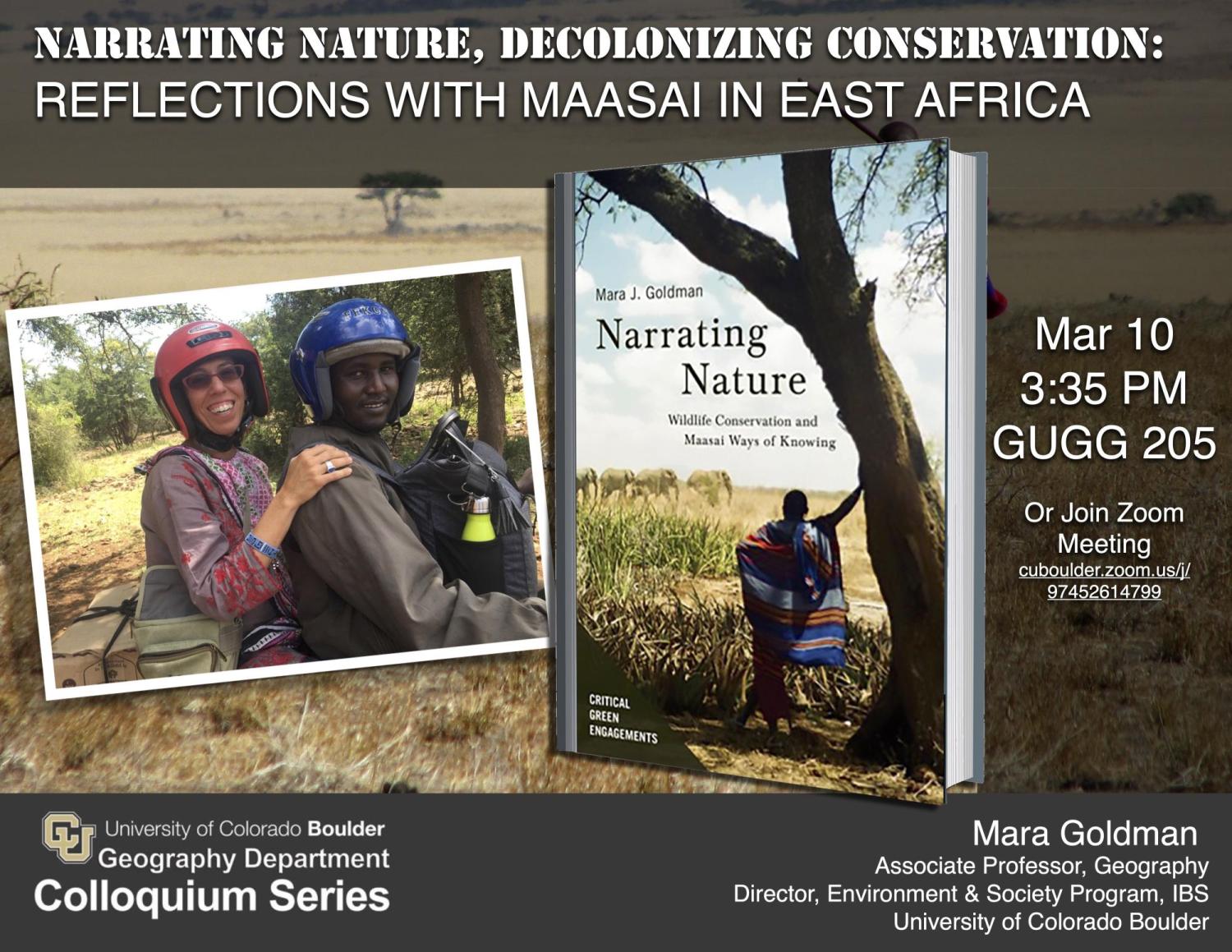Narrating Nature, Decolonizing Conservation: Reflections with Maasai in East Africa
Mara Goldman
Associate Professor, Geography
Director, Environment & Society Program, IBS
University of Colorado Boulder
In Person:
GUGG 205
Mar 10, 2023, 3:35 PM - 5:00 PM
Or Join Zoom Meeting:
Zoom login required (free account available at zoom.us)
Abstract
As the global community grapples with how to improve biodiversity conservation efforts, Indigenous communities around the world are demanding the process of conservation itself be decolonized. In this talk, I ask what this means globally, and where I work in Northern Tanzania where colonial models of violently separating indigenous people from their homes in the name of conservation is still happening. I present some aspects of my own approach to the work of decolonizing conservation through my book, Narrating Nature: Wildlife Conservation and Maasai Ways of Knowing (University of Arizona Press, 2020). The book draws on over two decades of fieldwork among Maasai pastoralists in northern Tanzania and southern Kenya. In the book, I seek to unsettle established ways of knowing, talking about, and managing human-wildlife relations and wildlife conservation in these landscapes and beyond, where Euro-American scientific approaches have historically dominated. I center customary Maasai knowledge production and presentation processes—in the form of narratives and the use of an active Maasai meeting/dialogue, the enkiguena. In challenging existing conservation models and the boundaries on which they rely (dividing people/nature, wild/domestic, and science/all other ways of knowing and being with nature), I ask what it might mean to talk about decolonizing conservation globally. I also ask how we can ask this question in academic, policy, advocacy circles as Maasai in Tanzania are currently facing eviction from their homes and physical, epistemic, and structural violence in the name of Conservation.
Bio
Mara Goldman is an Associate Professor in the Department of Geography, and Director for the Environment and Society Program at the Institute for Behavioral Sciences, at the University of Colorado-Boulder. She is also an affiliate faculty in the Gender and Women’s Studies Program and the Center for Native American and Indigenous Studies. She received her PhD in 2006 from the University of Wisconsin-Madison (geography) and holds an MS in Conservation Biology and Sustainable Development (UW-Madison, 2001) as well as an MA in Geography from the University of California Los Angeles (1998). She was a post-doctoral fellow at the International Livestock Research Institute (ILRI), in Nairobi, where she conducted research on “Communication and the Politics of Participation in Pastoral Societies,” among Maasai communities in southern Kenya and northern Tanzania.
Dr. Goldman’s research is situated in human-environment geography and can best be described as political ecology with specific attention to knowledge politics as related to conservation and development interventions. She draws on deep ethnographic engagements, political ecology and science studies scholarship, and feminist approaches to research and theory. She has worked for over two decades in East Africa, specifically with pastoral/agro-pastoral Maasai communities in Tanzania and Kenya and has recently begun to expand her research to include comparative work with forest-dwelling tribal communities in India. Her book, Narrating Nature: Wildlife conservation and Maasai ways of knowing, was published by the University Arizona Press, Critical Green Engagements Series in 2020. She is also co-editor (with P. Nadasdy, and M.D. Turner), of Knowing nature: Conversations at the intersection of political ecology and science studies. Chicago: University of Chicago Press, 2011, and has also published widely in Geography and conservation and development journals.
Current projects include a large-scale collaborative research project with scholars and co-researchers across Europe, Asia, and Africa on the effects of Covid-19 on dryland communities broadly, and on community conservation efforts. She is also involved in collaborative conversations on what it means to decolonize conservation, and to address gender as a factor in biodiversity conservation efforts, globally and within indigenous communities in East Africa and India.
Watch the Presentation
[video:https://vimeo.com/807010156]


